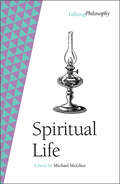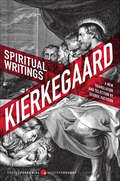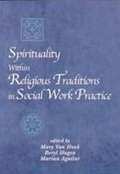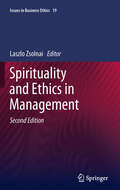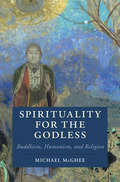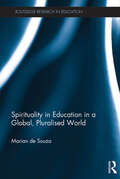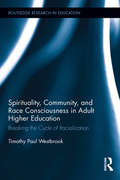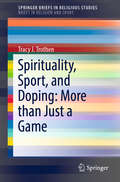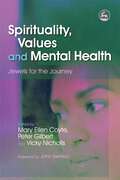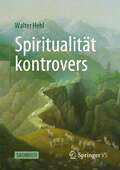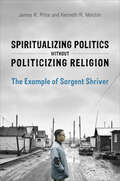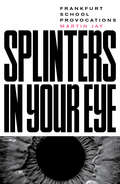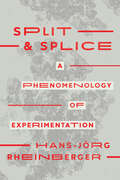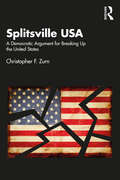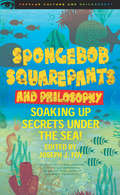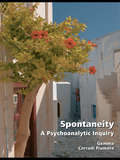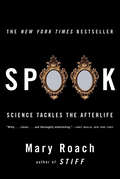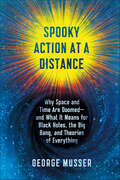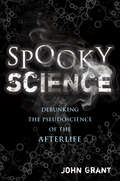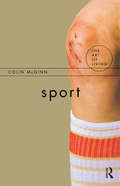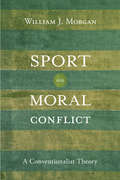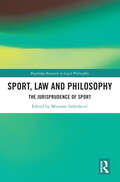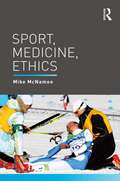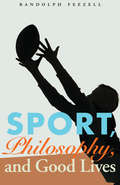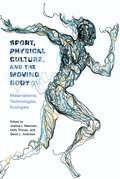- Table View
- List View
Spiritual Life (Talking Philosophy)
by Michael McGheeThe original claim made in the introduction to this classic volume was that it broke fresh ground: that it set a new agenda for the philosophy of religion and was a reaction against a narrow conception of the discipline that had little to say philosophically about human experience, or subjectivity, or about the religious imagination, or the idea of 'spirituality'. In a new Foreword to the book, Michael McGhee reflects on how the discipline has changed or remained the same in the intervening twenty-five years since first publication. He argues that the connections between 'philosophy' and 'spirituality' are still developing; and that what we think of as 'religious' or 'spiritual' is shifting, along with ideas about self-knowledge. The book contains pertinent chapters by some of the leading thinkers in the field, including Rowan Williams, Janet Soskice, Fergus Kerr, Stephen Clark and Paul Williams, who offers a comparative piece on Tibetan Buddhism.
Spiritual Writings: A New Translation and Selection (Harper Perennial Modern Thought Ser.)
by Søren Kierkegaard George Pattison“By far the most profound thinker of the 19th century” —Ludwig Wittgenstein “Kierkegaard’s great contribution to Western philosophy was to assert, or to reassert with Romantic urgency, that, subjectively speaking, each existence is the center of the universe.” —John Updike, The New YorkerHarper Perennial Modern Classics presents the rediscovered spiritual writings of Søren Kierkegaard, edited and translated by Oxford theologian George Pattison. Called “the first modernist” by The Guardian and “the father of existentialism” by the New York Times, Kierkegaard left an indelible imprint on existential writers from Sartre and Camus to Kafka and Derrida. In works like Fear and Trembling, Sickness unto Death, and Either/Or, he by famously articulated that all meaning is rooted in subjective experience—but the devotional essays that Patterson reveals in Spiritual Writings will forever change our understanding of the great philosopher, uncovering the spiritual foundations beneath his secularist philosophy.
Spirituality Within Religious Traditions in Social Work Practice
by Mary Van Hook Beryl Hugen Marian AguilarThis text for social workers and other counselors discusses how religious traditions shape people's lives and help them construct meaning about the world around them. Each of the 14 contributions from academics and clinicians describes the history of a particular religion, some of its rituals, basic beliefs, and its implications for social work practice. Some of the faiths profiled include Islam, Judaism, Native American spirituality, Hinduism, Buddhism, Catholicism, Mormonism, and the African-American Baptist tradition. Annotation c. Book News, Inc., Portland, OR (booknews.com)
Spirituality and Ethics in Management
by Laszlo ZsolnaiThe book - which was originally published by Kluwer in 2004 - is a collection of scholarly papers focusing on the role of spirituality and ethics in renewing the contemporary management praxis. The basic argument is that a more inclusive, holistic and peaceful approach to management is needed if business and political leaders are to uplift the environmentally degrading and socially disintegrating world of our age. The book uses diverse value-perspectives (Hindu, Catholic, Buddhist, and Humanist) and a variety of disciplines (philosophy, ethics, management studies, psychology, and organizational sciences) to extend traditional reflections on corporate purpose and focuses on a self-referential organizational-existential search for meaning, identity and success.
Spirituality for the Godless: Buddhism, Humanism, and Religion (Cambridge Studies in Religion, Philosophy, and Society)
by Michael McGheeMany people describe themselves as secular rather than religious, but they often qualify this statement by claiming an interest in spirituality. But what kind of spirituality is possible in the absence of religion? In this book, Michael McGhee shows how religious traditions and secular humanism function as 'schools of wisdom' whose aim is to expose and overcome the forces that obstruct justice. He examines the ancient conception of philosophy as a form of ethical self-inquiry and spiritual practice conducted by a community, showing how it helps us to reconceive the philosophy of religion in terms of philosophy as a way of life. McGhee discusses the idea of a dialogue between religion and atheism in terms of Buddhist practice and demonstrates how a non-theistic Buddhism can address itself to theistic traditions as well as to secular humanism. His book also explores how to shift the centre of gravity from religious belief towards states of mind and conduct.
Spirituality in Education in a Global, Pluralised World (Routledge Research in Education)
by Marian de SouzaA particular problem associated with international research in the field of spirituality and education is the reluctance of scholars to agree on what spirituality means, with numerous descriptions increasing ambiguity and reducing the impact of research in the discipline. This book argues that it is important to understand spirituality as a unifying concept that has the potential to be meaningful in its application to the lives of children and young people in areas of learning and wellbeing. Chapters show why and how spiritual learning should be addressed across the curriculum, with implications for the design of learning programs and environments.
Spirituality, Community, and Race Consciousness in Adult Higher Education: Breaking the Cycle of Racialization (Routledge Research in Education)
by Timothy Paul WestbrookDrawing on the lived experiences of Black students in adult degree completion programs at predominantly White, Christian institutions in the southern United States, this book presents a model for reimagining adult higher education. Westbrook explores the reasons students enrolled in degree programs, how they experience their predominantly white institutions, and how their experiences affect their lives. Employing Critical Race Theory and Christian theology as frameworks for evaluating the students’ experiences, the author sheds light on the ways African American experiences to inform, critique, and shape Christian adult learning in higher education.
Spirituality, Sport, and Doping: More than Just a Game (SpringerBriefs in Religious Studies)
by Tracy J. TrothenThis book explores the deeper meaning of sports. Drawing on contemporary research, the author makes a strong case for why we should see sport not only in terms of religion but--more importantly-as a possible location for spiritual meaning. Taking this a step farther, she considers how gene editing, robotics, and other biomedical technological enhancements affect not only sports performances but experiences of sport as sacred. In addition, the author explores what difference it might make to the enhancement debate if sports’ spirituality is taken seriously. The author is not afraid to explore the issue in all its complexity. Yet, the argument she presents is both meaningful and accessible. This investigation applies insights from Christian theology, applied ethics, psychology, and sports studies. From lightweight tennis racquets to anabolic steroids, athletes have long used technology and science to improve their performances. But, until now, no one has asked how biomedical technological enhancements might affect the undervalued spiritual dimension of sport. This book presents rich insights into the connection between sports, spirituality, and human enhancement technologies. It will appeal to researchers, athletes and sports followers, and undergraduate and graduate students in ethics, sport, religion or theology.
Spirituality, Values and Mental Health: Jewels for the Journey
by David Mitchell Andrew Powell Brian Thorne John Swinton Neil Thompson Sarah Carr Peter Gilbert Nigel Mills Azim Kidwai John Foskett Suman Fernando Fozia Sarwar Premila Trevedi Choman Hardi Vicky Nicholls Peter Bates Fatima Kassam Arthur Hawes Cameron Langlands Veronica Dewan Ju Blencowe Julia Head Tom Gordon Frances Basset B Spalek Anne Roberts Paul Grey Mark Bones Ali Jan Haider Barbara Pointon Mary Ellen Coyte Kim Woodbridge Wendy Edwards Christopher Newell Chris Mackenna Abina Parshad-Griffin Thurstine Basset Sarajane Aris Luftha Meah Paul Chapple Bill K. W. M. FulfordSpirituality, religious belief and inclusive faith communities are important for mental well being but mental health practitioners have few guidelines for acknowledging these issues when working with service users. Spirituality, Values and Mental Health gathers together personal and professional contributions from mental health professionals, carers and mental health service users and survivors. It addresses the stigma that can surround both mental health and spirituality and explores the place of the spiritual in mental health care, teasing out its implications for research, education, training and good practice. This book is a welcome source of ideas and common-sense that is essential reading for mental health practitioners, carers and service users, chaplains, faith leaders, faith communities, as well as students and professionals working in the field of spirituality and mental health.
Spiritualität kontrovers
by Walter HehlDas Buch versucht einen fairen Blick auf Spiritualität und Spirituelles aus Sicht der Physik und der modernen Geistesauffassung. So vieles soll spirituell sein, aber was ist es wirklich? Es gibt Aberglauben, Betrug und Illusionen einerseits und moderne Wissenschaft andererseits. Die Wissenschaft zeigt, was Geist ist, dass es unendlich Großes und unendlich Kleines gibt, dass wir so Vieles berechnen können - aber es bleibt das Mysteriöse. Manches in der Wissenschaft ist unmittelbar spirituell, etwa die Figuren von Lichtenberg und Chladni im 18. Jahrhundert und die Kirlian-Fotographie und Tesla-Kugeln heute. Vieles verstehen wir nur oberflächlich. Wenn es der Computer versteht und wir nicht, können wir nicht zufrieden sein. Die Grenzen des Wissens sind weit nach außen verschoben, aber wir sind klein geblieben. Wir stoßen an Grenzen und begegnen Spirituellem: im Unendlichen, im Unausweichlichen und im Unfassbaren. Diese Grenzen sollten uns demütig machen. Die moderne Wissenschaft zeigt diese Grenzen auf. Die Spiritualität ist dann eher die Erfahrung des Mysteriösen des Physikers Albert Einstein. Es gibt Spirituelles, etwa wie eh und je den Anblick des Sternenhimmels oder des Ozeans. Auch heute sind Orte wie Stonehenge spirituelle Plätze oder Kraftörter. Der Magnetismus im Elektrofahrzeug ist so spirituell wie im Magnetstein der Antike. Besonders spirituell ist die Verbindung der Natur mit der Mathematik.
Spiritualizing Politics without Politicizing Religion: The Example of Sargent Shriver
by Kenneth R. Melchin James R. PriceThe clash of religion and politics has been a steady source of polarization in North America. In order to think wisely and constructively about the spiritual dimension of our political life, there is need for an approach that can both maintain the diversity of belief and foster values founded on the principles of religion. In Spiritualizing Politics without Politicizing Religion, James R. Price and Kenneth R. Melchin provide a possible framework, approaching issues in politics via a profile of Sargent Shriver (1915-2011), an American diplomat, politician, and a driving force behind the creation of the Peace Corps. Focusing on the speeches Shriver delivered in the course of his work to advance civil rights and build world peace, Price and Melchin highlight the spiritual component of his efforts to improve institutional structures and solve social problems. They contextualize Shriver’s approach by contrasting it with contemporary, landmark decisions of the U.S Supreme Court on the role of religion in politics. In doing so, Spiritualizing Politics without Politicizing Religion explains that navigating the relationship of religion and politics requires attending to both the religious diversity that politics must guard and the religious involvements that politics needs to do its work.
Splinters in Your Eye: Essays on the Frankfurt School
by Martin JayAssessing the legacy of the Frankfurt School in the twenty-first centuryAlthough successive generations of the Frankfurt School have attempted to adapt Critical Theory to new circumstances, the work done by its founding members continues in the 21st century to unsettle conventional wisdom about culture, society and politics. Exploring unexamined episodes in the School's history and reading its work in unexpected ways, these essays provide ample evidence of the abiding relevance of Horkheimer, Adorno, Benjamin, Marcuse, Löwenthal, and Kracauer in our troubled times. Without forcing a unified argument, they range over a wide variety of topics, from the uncertain founding of the School to its mixed reception of psychoanalysis, from Benjamin's ruminations on stamp collecting to the ironies in the reception of Marcuse's One-Dimensional Man, from Löwenthal's role in Weimar's Jewish Renaissance to Horkheimer's involvement in the writing of the first history of the Frankfurt School. Of special note are their responses to visual issues such as the emancipation of color in modern art, the Jewish prohibition on images, the relationship between cinema and the public sphere, and the implications of a celebrated Family of Man photographic exhibition. The collection ends with two essays tracing the still metastasizing demonization of the Frankfurt School by the so-called Alt Right as the source of "cultural Marxism" and "political correctness," which has gained alarming international resonance and led to violence by radical right-wing fanatics.
Split and Splice: A Phenomenology of Experimentation
by Hans-Jörg RheinbergerAn esteemed historian of science explores the diversity of scientific experimentation. The experiment has long been seen as a test bed for theory, but in Split and Splice, Hans-Jörg Rheinberger makes the case, instead, for treating experimentation as a creative practice. His latest book provides an innovative look at the experimental protocols and connections that have made the life sciences so productive. Delving into the materiality of the experiment, the first part of the book assesses traces, models, grafting, and note-taking—the conditions that give experiments structure and make discovery possible. The second section widens its focus from micro-level laboratory processes to the temporal, spatial, and narrative links between experimental systems. Rheinberger narrates with accessible examples, most of which are drawn from molecular biology, including from the author’s laboratory notebooks from his years researching ribosomes. A critical hit when it was released in Germany, Split and Splice describes a method that involves irregular results and hit-or-miss connections—not analysis, not synthesis, but the splitting and splicing that form a scientific experiment. Building on Rheinberger’s earlier writing about science and epistemology, this book is a major achievement by one of today’s most influential theorists of scientific practice.
Splitsville USA: A Democratic Argument for Breaking Up the United States
by Christopher F. ZurnSplitsville USA argues that it’s time for us to break up to save representative democracy, proposing a mutually negotiated, peaceful dissolution of the current United States of America into several new nations. Zurn begins by examining the United States’ democratic predicament, a road most likely headed for electoral authoritarianism, with distinct possibilities of ungovernability and violent civil strife. Unlike others who share this diagnosis, Zurn presents a realistic picture of how we can get to reform and what it would involve. It is argued that "Splitsville" represents the most plausible way for American citizens to continue living under a republican form of government. Despite recent talk of secession and civil war, this book offers the most extensive treatment yet of the issues we need to think through to enable a peacefully negotiated political divorce. Splitsville USA is a provocative conversation opener about the problems that have gotten us into our current political pickle and how to get out of it by seizing the reins of our own constitutional destiny. The book will appeal to readers of political science, American politics, history, political philosophy, and law, along with all general readers interested in the future of democracy in the United States.
SpongeBob SquarePants and Philosophy
by Joseph J. FoySpongeBob SquarePants and Philosophy introduces fans of SpongeBob SquarePants to some of the great thinkers and questions in philosophy. The essays can be shared by young and old alike, kindling new interest in philosophy and life's big questions. What keeps SpongeBob "reeling in" major audiences on a daily basis is that underneath the lighthearted and whimsical exterior are the seeds of philosophical discussions about identity and the self, our obligations toward others, benefits and tensions of the individual in community, principles of the marketplace and environmental ethics, and questions of just how exactly Jack Kahuna Laguna can build a fire at the bottom of the ocean. (Okay, so perhaps we don't have an answer for that last one, but maybe if you look into that fire long enough the answer will be revealed.)The book begins with a section exploration of the major characters of the series. For instance, chapter 1 uses the philosophies of Aristotle to demonstrate why SpongeBob, more than any other character in the series, is defined by a life of well-being and flourishing. Chapter two provides an assessment of SpongeBob's best friend, Patrick Star.
Spontaneity: A Psychoanalytic Inquiry
by Gemma Corradi FiumaraPsychoanalytic theory frequently explains psychopathology from the perspective of either inadequate early care or as the result of environmental factors. In this book the author suggests that poor mental health can be a result of our incapacity to respond to internal and external stimuli, and indicates that spontaneity is essential in the development of many aspects of the self. It is not what happens to us, but how we react to events, that forms who we are. Spontaneity presents an original approach to issues of agency, spontaneity and creativity in psychoanalysis by exploring questions including: active internalisation paradox forgiveness responsibility empathy self de-creation. This book will be essential reading for psychoanalysts, psychotherapists, philosophers and psychologists. It will also prove to be engaging for those interested in psychoanalytic theory and theories of subjectivity.
Spook: Science Tackles the Afterlife
by Mary RoachThe best-selling author of Stiff and Bonk trains her considerable wit and curiosity on the human soul. "What happens when we die? Does the light just go out and that's that—the million-year nap? Or will some part of my personality, my me-ness persist? What will that feel like? What will I do all day? Is there a place to plug in my lap-top?" In an attempt to find out, Mary Roach brings her tireless curiosity to bear on an array of contemporary and historical soul-searchers: scientists, schemers, engineers, mediums, all trying to prove (or disprove) that life goes on after we die.
Spooky Action at a Distance: Why Space and Times Are Doomed—and What It Means for Black Holes, the Big Bang, and Theories of Everything
by George MusserLong-listed for the 2016 PEN/E. O. Wilson Literary Science Writing AwardDelightfully readable, Spooky Action at a Distance is a mind-bending voyage to the frontiers of modern physics that will change the way we think about reality.What is space? It isn't a question that most of us normally ask. Space is the venue of physics; it's where things exist, where they move and take shape. Yet over the past few decades, physicists have discovered a phenomenon that operates outside the confines of space and time: nonlocality--the ability of two particles to act in harmony no matter how far apart they may be. It appears to be almost magical. Einstein grappled with this oddity and couldn't come to terms with it, describing it as "spooky action at a distance." More recently, the mystery has deepened as other forms of nonlocality have been uncovered. This strange occurrence, which has direct connections to black holes, particle collisions, and even the workings of gravity, holds the potential to undermine our most basic understandings of physical reality. If space isn't what we thought it was, then what is it? In Spooky Action at a Distance, George Musser sets out to answer that question, offering a provocative exploration of nonlocality and a celebration of the scientists who are trying to explain it. Musser guides us on an epic journey into the lives of experimental physicists observing particles acting in tandem, astronomers finding galaxies that look statistically identical, and cosmologists hoping to unravel the paradoxes surrounding the big bang. He traces the often contentious debates over nonlocality through major discoveries and disruptions of the twentieth century and shows how scientists faced with the same undisputed experimental evidence develop wildly different explanations for that evidence. Their conclusions challenge our understanding of not only space and time but also the origins of the universe-and they suggest a new grand unified theory of physics. “An important book that provides insight into key new developments in our understanding of the nature of space, time and the universe. It will repay careful study.” —John Gribbin, The Wall Street Journal“An endlessly surprising foray into the current mother of physics' many knotty mysteries, the solving of which may unveil the weirdness of quantum particles, black holes, and the essential unity of nature.” —Kirkus Reviews (starred review)
Spooky Science: Debunking the Pseudoscience of the Afterlife
by John GrantSkeptics of the supernatural will enjoy this humorous jaunt through the long history of scientific inquiry into paranormal and psychic phenomena. Life after death, spirit communication, the astral plane, reincarnation: on the relatively rare occasions when scientists have tried to apply their methods to the paranormal, they've often ended up embarrassed—fooled by obvious charlatans, deluded into making irrational and unsubstantiated claims, or frustrated in their attempt to find something that just isn&’t there. John Grant—author of Discarded Science and Corrupted Science—investigates the pseudoscience of spooky stuff to fascinating and often hilarious effect.
Sport (The Art of Living)
by Colin McGinnWhether it's conkers in the schoolyard, kicking a football in the park, or playing tennis on Wimbledon Centre Court, sport impacts all of our lives. But what is sport and why do we do it? Colin McGinn, renowned philosopher (and kiteboarder), reflects on our love of sport and explores the value it has for us and the part it plays in a life lived well. Written in the form of a memoir, McGinn discusses many of the sports he has engaged in - from pole-vaulting and gymnastics to windsurfing and tennis - and describes the athletic experience from the inside, as a participant, articulating what is uniquely valuable about sport as an activity. Sport, argues McGinn, takes us to our fullest potential as human beings, it's what we fling at mortality to keep it at bay, a holiday from the Unbearable Heaviness of Being. "Sport" expresses our nature, it bears upon our self-realization. If a happy life consists in one that expresses fully our natural faculties, then sports must play an essential role in our lifes. Mind-body unity, the nature of practical knowledge and physical skill, success and failure, the ethics of competition, peak experiences, the spectacle of professional sport, aesthetics and death, McGinn discusses these and many other issues while telling of his own sporting mishaps and adventures. To use the vernacular of philosophy, "Sport" captures the phenomenology of sport - what it's like to do it - and in doing so shows how sport is a way of expressing and understanding who and what we are, way beyond whether we are a good sportsman, a bad loser or a team-player. For anyone who has ever thought that there must be less humiliating ways to enjoy yourself than being thrashed on the tennis court, "Sport" will reassure you that it's time not wasted.
Sport and Moral Conflict: A Conventionalist Theory
by William J. MorganWhat is the purpose of sport, and how are ethical conceptions of sport shaped by the answers to this question? In Sport and Moral Conflict, William Morgan investigates, examining sport as a moral crucible that puts athletes in competitive, emotionally charged situations where fairness and equality are contested alongside accomplishment. Morgan looks at the modern Olympics—from 1906 Athens to 1924 Paris, when the Games reached international prestige — in order to highlight the debate about athletic excellence and the amateur-professional divide. Whereas the Americans emphasized winning, the Europeans valued a love of the game. Morgan argues that the existing moral theories of sport—formalism and broad internalism (aka interpretivism), which rely on rules and general principles—fall short when confronted with such a dispute as the transition from amateur to professional sport. As such, he develops a theory of conventionalism, in which the norms at work in athletic communities determine how players should ethically acquit themselves. Presenting his case for an ethical theory of sport, Morgan provides insights regarding the moral controversies and crises that persist today.
Sport, Law and Philosophy: The Jurisprudence of Sport (Routledge Research in Legal Philosophy)
by Miroslav ImbriševićSport, Law and Philosophy: The Jurisprudence of Sport discusses the intersection of law and sport and highlights its usefulness to both legal scholars and philosophers of sport. There is a general recognition that law and sports bear strong similarities. Both can be understood as systems of rules, with a judge/referee who has the power to adjudicate and to issue punishments/penalties. Divided into two parts, this volume presents an exploration of central philosophical issues arising from the intersections of law and sport and makes reference to current events and controversies. Experts from across the globe discuss a range of issues such as sports as legal systems, the game as a social contract, the role of the referee, including VAR, rule breaking, equality in women’s sport, justice on the sports field and in the court room, and issues surrounding the application of law to sports. The book will be a valuable resource to Undergraduates, Postgraduates and for those working in the areas of legal philosophy, sports law, and philosophy of sport.
Sport, Medicine, Ethics
by Mike McNameeThe ethics of sports medicine is an important emerging area within biomedical ethics. The professionalization of medical support services in sport and continuing debates around issues such as performance-enhancing technologies or the health and welfare of athletes mean that all practitioners in sport, as well as researchers with an interest in sports ethics, need to develop a clear understanding of the ethical aspects of the sport–medicine nexus. This timely collection of articles explores the conceptual and practical issues that shape and define ethics in sports medicine. Examining central topics such as consent, confidentiality, pain, doping and genetic technology, this book establishes an important baseline for future academic and professional work in this area.
Sport, Philosophy, and Good Lives
by Randolph FeezellThere&’s more to sports than the ethos of competition, entertainment, and commercialism expressed in popular media and discourse. Sport, Philosophy, and Good Lives discusses sport in the context of several traditional philosophical questions, including: What is a good human life and how does sport factor into it? To whom do we look for ethical guidance? What makes human activities or projects meaningful? Randolph Feezell examines these questions along with other relevant topics in the philosophy of sport such as the contribution of play to a meaningful life, the various reasons for pessimistic views of sport, the various claims that celebrated athletes are role models, and the seldom-questioned view that coaches are in a position to offer advice to athletes on how to live or on leadership skills. He also discusses the way that non-Western attitudes found in Buddhism, Taoism, and the Bhagavad Gita might be used to address the vulnerabilities of sports participants.Feezell draws from current sports issues, popular literature, and contemporary sports figures to shed light on the attraction and value of sports and examine the accompanying ethical issues.
Sport, Physical Culture, and the Moving Body: Materialisms, Technologies, Ecologies (Critical Issues in Sport and Society)
by David Andrews Samantha Frost Simone Fullagar Mary Louise Adams Samantha King Pirkko Markula Michael D. Giardina Matthew G. Hawzen Oliver Rick Jacob J. Bustad Richard Pringle Mary G. McDonald Kiri Baxter Douglas Booth Kyle S Bunds Mariana Clark Simon C Darnell Jennifer Sterling Christopher McLeod Shannon Leigh Jette Katelyn Esmonde Carolyn Pluim Gavin WeedonThe moving body—pervasively occupied by fitness activities, intense training and dieting regimes, recreational practices, and high-profile sporting mega-events—holds a vital function in contemporary society. As the body moves—as it performs, sweats, runs, and jumps—it sets in motion an intricate web of scientific rationalities, spatial arrangements, corporate imperatives, and identity politics (i.e. politics of gender, race, social class, etc.). It represents vitality in its productive and physiological capacities, it drives a complex economy of experiences and products, and it is a meaningful site of cultural identities and politics. Contributors to Sport, Physical Culture, and the Moving Body work from a simple premise: as it moves, the material body matters. Adding to the burgeoning fields of sport studies and body studies, the works featured here draw upon the traditions of feminist theory, posthumanism, actor network theory, and new materialism to reposition the physical, moving body as crucial to the cultural, political, environmental, and economic systems that it constitutes and within which is constituted. Once assembled, the book presents a study of bodies in motion—made to move in contexts where technique, performance, speed, strength, and vitality not only define the conduct therein, but provide the very reason for the body’s being within those economies and environments. In so doing, the contributors look to how the body moving for and about rational systems of science, medicine, markets, and geopolity shapes the social and material world in important and unexpected ways. In Sport, Physical Culture, and the Moving Body, contributors explore the extent to which the body, when moving about both ostensibly active body spaces (i.e., the gymnasium, the ball field, exercise laboratory, the track or running trail, the beach, or the sport stadium) and those places less often connected to physical activity (i.e. the home, the street, the classroom, the automobile), is bounded to technologies of life and living; and to the political arrangements that seek to capitalize upon such frames of biological vitality. To do so, the authors problematize the rise of active body science (i.e. kinesiology, sport and exercise sciences, performance biotechnology) and the effects these scientific interventions have on embodied, lived experience. Contributors to Sport, Physical Culture, and the Moving Body will be engaging a range of new and emerging theoretical perspectives, including new materialist, political ecology, developmental systems theory, and new material feminist approaches, to examine the actors and assemblages of movement-based material, political, and economic production. In so doing, contributors will vividly and powerfully illustrate the extent to which a focus on the fleshed body and its material conditions can bring forth new insights or ontological and epistemological innovation to the sociology of sport and physical activity. They will also explore the agency of the body as and amongst things. Such a performative materialist approach explicates how complex assemblages of sport and physical activity—bringing into association everything from muscle fibers and dietary proteins to stadium concrete or regional aquifers—are not only meaningful, but ecological. By focusing on the confluence of agentive materialities, disciplinary technologies, vibrant assemblages, speculative realities, and vital performativities, Sport, Physical Culture, and the Moving Body promises to offer a groundbreaking departure from representationalist tendencies and orthodoxies brought about by the cultural turn in sport and physical cultural studies. It brings the moving body and its physics back into focus: recentering moving flesh and bones as locus of social order, environmental change, and the global political economy.
